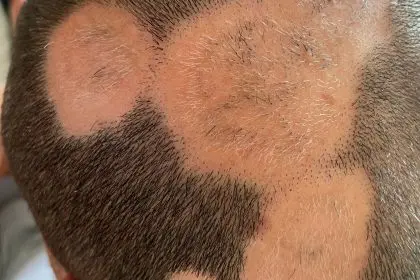A personal journey through post-surgical skin challenges and solutions

The unexpected effects of bariatric surgery
While bariatric surgery often serves as a transformative solution for hormonal imbalances, the journey doesn’t end with the procedure itself. Many patients discover that this “factory reset” of their body systems can trigger unexpected changes in their skin and scalp health, creating new challenges to navigate during recovery. These changes can affect daily life and require thoughtful management to ensure a successful post-surgical experience.
Understanding post-surgical changes
The relationship between hormonal fluctuations and skin health becomes particularly evident after bariatric procedures. These changes can manifest in various ways, such as increased skin sensitivity, dryness, and an altered skin barrier. Some individuals may notice shifts in hair texture or experience scalp conditions like seborrheic dermatitis. These changes may feel surprising and even distressing for those who have undergone the procedure to improve overall health.
The body’s transition after surgery impacts not only the skin’s surface but also the deeper physiological processes. For example, changes in oil production can leave the skin feeling dry despite an oily appearance, or vice versa. Understanding how hormones, nutrition, and the body’s natural recovery mechanisms interact is essential for managing these changes effectively.
The science behind scalp health
Seborrheic dermatitis, a condition affecting approximately 50 million Americans, is more than just a common dandruff issue. This condition results from a complex interplay of hormonal changes, the presence of fungal microorganisms like Malassezia on the scalp, and shifts in the immune system. After bariatric surgery, a sudden decrease in body weight and alterations in nutrient absorption can affect the skin’s barrier function, making it more susceptible to inflammation and irritation.
These changes can sometimes be exacerbated by external factors, such as harsh skincare products or environmental conditions. A disrupted skin barrier may lead to increased sensitivity, contributing to further issues like redness, itching, and flakes. Addressing these issues requires a balanced approach that includes medical treatment and self-care strategies tailored to post-surgery needs.
Identifying symptoms and triggers
Post-surgical skin changes often present with distinct characteristics that are different from pre-surgery conditions. Symptoms can range from scaly, itchy patches beyond the scalp to oily yet dry skin conditions. Some people experience increased inflammation in specific areas, which can be uncomfortable and potentially interfere with daily routines. Sensitivity to environmental factors such as temperature changes, harsh weather, or certain fabrics may also become more pronounced.
Understanding these symptoms is vital for distinguishing between temporary post-surgical side effects and those that may require medical attention. Keeping track of when symptoms worsen or improve can help patients and healthcare providers determine the most effective strategies for managing skin and scalp health.
Treatment approaches
Managing post-surgical skin conditions requires a comprehensive approach that combines medical treatments with natural solutions.
Medical solutions
Prescription treatments, such as antifungal creams containing ketoconazole, can be effective for controlling conditions like seborrheic dermatitis. Regular dermatological check-ups help ensure any new or recurring symptoms are addressed promptly. For severe cases, prescription medications may be necessary to manage inflammation and balance hormone levels.
Dermatologists may recommend specialized skincare routines to reinforce the skin barrier. These routines often include products with gentle, hydrating formulas that avoid harsh chemicals or potential irritants.
Natural interventions
Natural treatment options, like gentle cleansing techniques, are essential to avoid exacerbating skin sensitivity. Regular moisturization using products with ceramides and natural oils can help restore hydration and strengthen the skin barrier. Additionally, stress management practices, such as yoga and mindfulness, play a crucial role in maintaining overall skin health. Stress can trigger inflammation and negatively impact the immune system, making it even more important to keep stress levels under control.
Finding the right products
Selecting the right skincare products becomes crucial during recovery. Patients should look for gentle, non-irritating formulas, preferably fragrance-free and designed for sensitive skin. It’s important to research active ingredients and avoid products that contain alcohol, sulfates, or parabens, which can be drying or irritating. Testing new products on a small patch of skin before full application is recommended to prevent unexpected reactions.
The role of professional support
Healthcare professionals play a vital role in managing post-surgical skin health. Regular consultations with dermatologists can provide guidance on appropriate skincare regimens and detect any potential issues early. Coordination between dermatologists and the bariatric surgery team is key to understanding how the surgery impacts skin health and adjusting treatment plans as needed.
Hormonal changes may require specialized attention from endocrinologists to help balance hormone levels and support skin recovery. Adjustments to treatment plans might be necessary as patients progress through recovery and adapt to new nutritional and lifestyle routines.
Lifestyle adjustments
Supporting skin health after surgery often requires lifestyle modifications. Staying hydrated is essential to maintain skin elasticity and support the healing process. Following a balanced, nutrient-rich diet that includes vitamins such as A, C, and E, along with omega-3 fatty acids, helps promote healthy skin from the inside out. Establishing a consistent skincare routine that includes gentle cleansing and moisturization can go a long way in maintaining skin resilience.
Avoiding triggers that worsen symptoms, such as high humidity or prolonged sun exposure, is equally important. Wearing protective clothing or using sunscreen can prevent further damage and reduce the risk of inflammation.
Long-term management strategies
Successful management of post-surgical skin conditions typically involves long-term maintenance routines. This may include seasonal adjustments to skincare routines, preventive measures like using non-comedogenic products, and regular skin checks to monitor changes. Consistency is key, as it takes time for the skin and scalp to adapt to new routines and recover fully from the surgery’s impact.
Personal experience insights
Real-world experiences reveal common patterns among patients. Many report initial challenges with finding the right products and enduring trial and error in seeking effective solutions. Patience is essential, as improvements in skin and scalp health often take time. However, a consistent care routine, combined with professional guidance, can lead to positive outcomes and a greater sense of well-being.
Future considerations
Looking ahead, the field of post-surgical skincare continues to evolve. Emerging treatment options include advanced topical formulations and innovations in skincare technology. Better understanding of the hormonal impacts on skin and scalp health paves the way for more targeted, effective treatments. The development of specialized products designed with the unique needs of post-bariatric patients in mind can improve care and outcomes.
Conclusion
While bariatric surgery can significantly improve hormonal health, understanding and preparing for potential skin changes remains crucial. With proper care, support, and treatment, these challenges can be effectively managed, leading to improved quality of life post-surgery.












